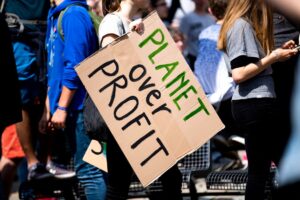Sociology is the scientific study of social relationships, social institutions, and societies. It delves into understanding how human actions and consciousness shape and are shaped by surrounding cultural and social structures. Unlike psychology, which focuses on individuals, sociology concentrates on groups, institutions, and social processes. Sociology helps us comprehend the complexities of social life. It enables us to understand social dynamics, address social issues, and influence public policy.
 The COVID-19 pandemic has served as a profound and comprehensive case study for illustrating various sociological concepts; it has offered a lens through which we can examine how societies function, adapt, and face challenges. Let’s take a look at how the pandemic encapsulates key sociological concepts.
The COVID-19 pandemic has served as a profound and comprehensive case study for illustrating various sociological concepts; it has offered a lens through which we can examine how societies function, adapt, and face challenges. Let’s take a look at how the pandemic encapsulates key sociological concepts.
Social structure is the distinctive and stable arrangements of social patterns that form the society as a whole. This includes entities like families, education systems, religious institutions, economic organizations, and political systems. The COVID-19 pandemic significantly disrupted social structures, affecting everything from family dynamics to economic systems.
The pandemic profoundly altered family dynamics worldwide. With lockdowns and social distancing measures in place, families spent unprecedented amounts of time together; this increased proximity led to both positive and negative outcomes. Some families reported strengthened bonds as they navigated challenges together, rediscovered shared activities, and provided mutual support during trying times. On the other hand, the pandemic exacerbated tensions and stress within households. Reports of domestic violence and child abuse increased, highlighting vulnerabilities in family structures under lockdown.
Social change(s) are the forces that change the organization and social structures of society. The pandemic was a significant catalyst for social change, affecting various aspects of society and prompting shifts in policies and public attitudes. Increased awareness and action around social justice issues and environmental sustainability highlight the profound impact of collective action and societal pressures on driving social change.
 Movements like Fridays for Future, led by Greta Thunberg, have galvanized global efforts to combat climate change. These movements have influenced policy changes, corporate practices, and individual behaviors toward more sustainable practices. The Black Lives Matter movement brought issues of racial injustice and police brutality to the forefront. Protests and advocacy have led to policy changes, increased awareness, and a push for systemic reforms in policing and criminal justice. The growing disparity in wealth has sparked movements advocating for economic justice, such as the Fight for $15 campaign for raising the minimum wage. These movements aim to address income inequality and ensure fair wages for all workers.
Movements like Fridays for Future, led by Greta Thunberg, have galvanized global efforts to combat climate change. These movements have influenced policy changes, corporate practices, and individual behaviors toward more sustainable practices. The Black Lives Matter movement brought issues of racial injustice and police brutality to the forefront. Protests and advocacy have led to policy changes, increased awareness, and a push for systemic reforms in policing and criminal justice. The growing disparity in wealth has sparked movements advocating for economic justice, such as the Fight for $15 campaign for raising the minimum wage. These movements aim to address income inequality and ensure fair wages for all workers.
The sociological imagination is the ability to see the details of our own lives in the context of larger social structures as opposed to merely personal choices or personal troubles. The COVID-19 pandemic offers a clear example of how the sociological imagination can be applied to understand the intersection of personal experiences and larger social forces, such as health and well-being.
 During the pandemic, numerous people faced health challenges, with over 103 million people in just the United States contracting the virus, and nearly half of Americans experiencing symptoms of anxiety or depression. Understanding those personal health experiences requires examining public health policies, healthcare infrastructure, and societal attitudes toward health and wellness. For example, the effectiveness of lockdowns, vaccination campaigns, and public health messaging played a critical role in shaping personal health outcomes. Inequalities in access to healthcare services influenced who received timely and adequate care, highlighting systemic issues in health systems. The availability and accessibility of mental health resources impacted individuals’ ability to cope with pandemic-related stress.
During the pandemic, numerous people faced health challenges, with over 103 million people in just the United States contracting the virus, and nearly half of Americans experiencing symptoms of anxiety or depression. Understanding those personal health experiences requires examining public health policies, healthcare infrastructure, and societal attitudes toward health and wellness. For example, the effectiveness of lockdowns, vaccination campaigns, and public health messaging played a critical role in shaping personal health outcomes. Inequalities in access to healthcare services influenced who received timely and adequate care, highlighting systemic issues in health systems. The availability and accessibility of mental health resources impacted individuals’ ability to cope with pandemic-related stress.
Social problems are the societal-caused conditions that harm segments of society. The pandemic has brought several social problems to the forefront, highlighting health disparities, unemployment, and access to education.
Education systems were profoundly disrupted by the pandemic, worsening existing inequalities. The shift to online learning revealed significant disparities in technological access; students from low-income families often lacked reliable internet access and necessary devices, hindering their ability to participate in remote education. Prolonged school closures and the challenges of remote learning led to significant learning loss, particularly for younger students and those with special educational needs, This learning loss is expected to have long-term implications for educational attainment, and potentially economic opportunities. The isolation and stress associated with remote learning also affected students’ mental health. Increased anxiety, depression, and feelings of disconnection were reported, highlighting the need for better mental health support within educational systems.
The sociological perspective is the process of understanding and explaining how individuals and groups interact within society. It allows us to see the connections between personal experiences and larger social forces. By employing this perspective, we can better understand how societal structures shape our lives. The sociological perspective addresses complex social problems and fosters meaningful social change.
The COVID-19 pandemic serves as a comprehensive glimpse into those sociological concepts, showing us firsthand how societal structures, institutions, inequalities, and processes of socialization and change play out during extraordinary times. Examining the pandemic through a sociological lens offers valuable insights into human behavior, social dynamics, and how societies adapt in times of crisis. This perspective not only sheds light on the immediate challenges we face but also reveals the enduring impact of global events on individuals and communities worldwide. It’s a reminder of the resilience and complexity woven into our social fabric, urging us to rethink and reimagine our approaches to social issues in a rapidly changing world.
Ayda is a guest blogger at UITAC Publishing. UITAC’s mission is to provide high-quality, affordable, and socially responsible online course materials.
Images used in this blog:
- “People Inside A Bus Wearing Masks” by zydeaosika is licensed on Pexels. This image has not been altered.
- Photo by Markus Spiske is licensed on Pexels. This image has not been altered.
- “White Hospital Beds” is licensed on Pexels. This image has not been altered.
- “A kid reading a book” by Tima Miroshnichenko is licensed on Pexels. This image has not been altered.




